The way you feel while you are awake and training depends largely on what happens while you are asleep.
Sleep plays a vital role in your health and your mental & physical well-being. Which contributes to improving your running performance.
Sleep is extremely important for runners because, without adequate, good-quality sleep, runners are at a higher risk of developing long-term health problems. Their ability to think, react, learn and engage with others decreases, and their circulatory system, metabolism, respiratory system, and immune system will also be affected negatively.
In this article, we are going to have a detailed look at 9 reasons why prioritizing sleep will improve your running as well as everything else you need to know about sleep and your running performance…
Let’s begin!
9 Reasons Why Prioritising Sleep Will Improve Your Running
- Build Muscle & Repair Tissue
- Athletic Performance
- Hormonal Balance
- Water Reabsorption
- Concentration
- Injury Risk
- Immunity Boost
- Memory
- Heart and circulatory system
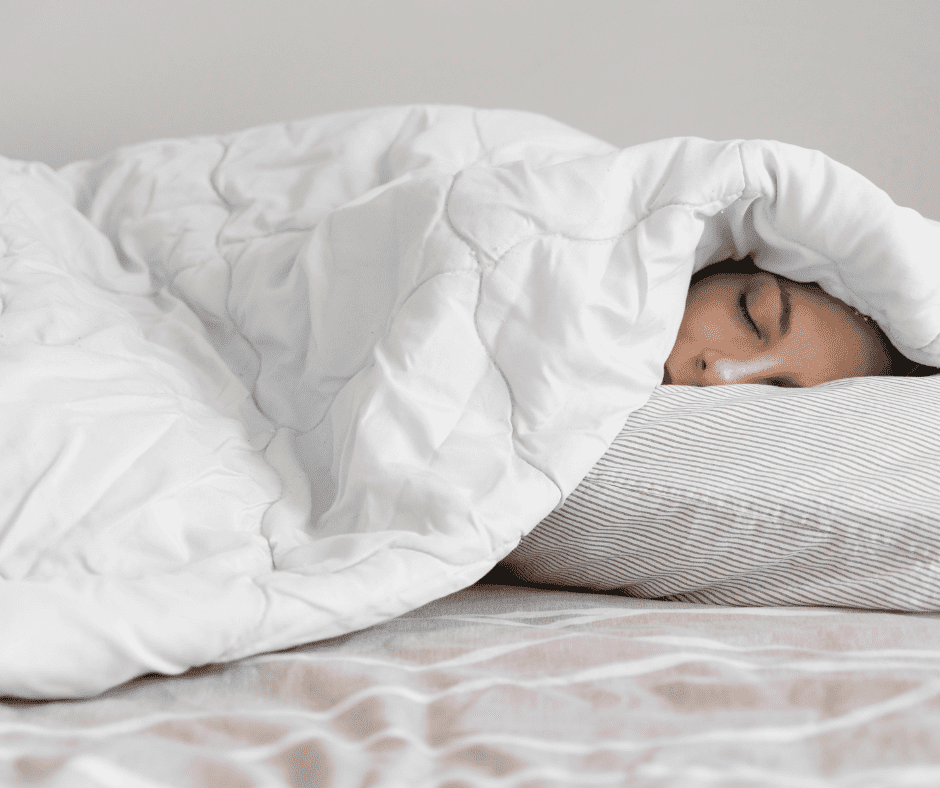
Build Muscle & Repair Tissue
When you sleep deeply, Human Growth Hormone is released.
HGH aids in repairing tissue, building muscle, strengthening bones, and converting fat to fuel.
When you run, you aren’t just building your stamina and strength; you’re also breaking your body down, causing a tiny amount of tissue damage with every step.
Allowing yourself time to recover after your runs is what makes it possible for you to come back better adapted-for your next run.
HGH also aids in healing your muscle tissue after a running injury. This is why sleep is a VITAL component of your recovery and should be taken as seriously as your training.
Articles often mention that HGH can contribute to slowing down the aging process… research supporting these claims is limited.
This hormone also stimulates your liver to make an insulin-like protein that produces cartilage cells, which contribute to your bone and organ health.
Speaking of bone health, we put together an article teaching you more about why bone health is so important and how to take care of your bones as you age. It’s called: Bone Health: What You NEED To Know As You Get Older, you can read it here.
Athletic Performance

Getting enough sleep is crucial for athletic performance.
Loads of studies show that a night of good sleep can improve speed, accuracy, and reaction time in athletes.
Carbohydrates help provide an easy source of energy for the body, when we break those carbs down, the sugars are stored in our muscles as glycogen. The glycogen is what we use up on our runs.
When you don’t get an adequate amount of sleep, your body is less able to store those carbohydrates, meaning less glycogen available on your run.
According to this study, inadequate sleep can impair your endurance.
Athletes who sleep less have lower glycogen stores, which results in them being unable to produce as much energy, leading to a decrease in athletic performance.
Hormonal Balance
Inadequate sleep causes your body to produce less Human Growth Hormone and produce more Cortisol. Both of these effects make it very hard for your body to recover properly.
Ghrelin hormone: Famously known as the “hunger hormone” because of its stimulatory effects on food intake, fat deposition, and growth hormone release.
Leptin hormone: Regulates energy balance, suppressing food intake and thereby inducing weight loss.
When we don’t get enough sleep, we have an increase in Ghrelin and a decrease in Leptin. This results in us eating more, even if we don’t need to because we don’t have a strong signal to stop.
Water Reabsorption
Drinking water is essential. H2O accounts for up to 60% of the human body, and it helps with a wide variety of bodily functions, like cell growth, waste removal, and digestion.
One of the ways getting a good night’s sleep can benefit your running is…water reabsorption.
When you sleep, your kidney balances water, sodium, and other electrolytes. Without enough water, the kidneys can’t balance electrolytes properly.
Recent research suggests that insufficient sleep may cause dehydration, which is caused by disrupting the release of a hormone (vasopressin) that is key to regulating hydration.
In this study, they found that people who regularly got 6 or fewer hours of sleep each night had more concentrated urine than those who got about 8 hours per night.
Short sleep duration was associated with higher odds of inadequate hydration.
It was also reported that people who regularly slept for 6 hours or less each night were 16% – 59% percent more likely to be dehydrated than those who slept for 8 hours a night.
Concentration
When people don’t get enough sleep, their attention and concentration abilities decline.
Less sleep results in reaction time lengthening, inattentiveness, and responding poorly to environmental signals.
This hampers your ability to perform simple tasks that require logical reasoning.
Reduce Injury Risk
I think I can speak on behalf of all runners when I say that there is no greater fear than a potential running injury during marathon season.
Your risk of getting injured during training is increased when you don’t get enough quality sleep, according to this study.
Another study found that the biggest increase in injuries was among those who skimped on sleep.
Immunity Boost
Let’s face it, no one want’s to be sick a week away from race day…
When you sleep your body produces cytokines–hormones that help build immunity and combat infections.
Getting sufficient hours of high-quality sleep enables a well-balanced immune defense that features strong innate and adaptive immunity.
Memory
One of the main functions of sleep is memory consolidation. Sleep helps with the formation of long-term memories.
When you get a good quality night’s sleep you strengthen the neural connections that create your memories. Without an adequate amount of sleep, those neurons don’t function properly, which inhibits your ability to remember things.
Heart & Circulatory System
When you enter REM sleep, your blood pressure and heart rate fall.
See 4th stage of sleep below:
In the REM stage of sleep your sympathetic system is activated, increasing your heart rate and blood pressure to the usual levels when you are awake but relaxed.
Adequate sleep duration is associated with a lower risk of heart disease.
Most of us wake up early before the rest of the family to get our run or strength training in, this means we get less sleep. We can often do that after a restless night of bad-quality sleep…
So that beg’s the question…
Should We Run On Little To No sleep?
Running on no sleep comes with some dangerous health implications. Doing it once in a while (If extremely necessary is alright) but it’s the continuous routine of this that leads to the risk of illness and injury…
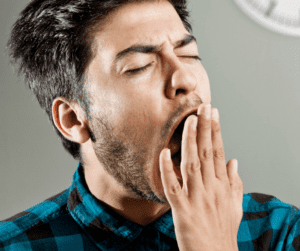
We put together an article outlining the following points:
- Should You Run If You Feel Tired
- The Importance Of a Good Night’s Sleep
- Safety Concerns Of Running When Sleep Deprived
- What Can You Do If You Are Sleep Deprived
Find out if you should be running on little to no sleep here.
So now that you know the basics of why sleep is important to training, here are some tips to help you get the right amount of sleep.
Tips To Help You Get a Quality Night’s Sleep:
- Limit your alcohol intake.
- Avoid exercise within 3 hours of bedtime.
- One hour before bed, wind down with something calm and relaxing like reading a book.
- Limit your caffeine intake from lunchtime.
- Keep your bedroom cool and dark.
- Ensure there are no flickering lights, there should be no cellphone beeping lights or TV lights.
Now that we know your sleep routine is as important as your training routine – This is especially true in the few days leading up to race day…
Tips For How To Sleep Well The Night Before a Race
- Try to sleep as much as you can in the days leading up to the race.
- Prepare for your race early the day before by laying out your number, gear, race nutrition, and pre-race food.
- Set your alarm and triple-check it so that you go to sleep without any worries.
- Relax before bedtime, have a bath, read a book, and avoid blue lights (cell phone & TV).
- If you’re feeling too nervous to sleep, visualize yourself on race day and run through what you want to happen.
Still wondering if it’s really worth it, have a look at a few different studies that all prove why athletes, including runners, need to prioritize sleep… Click here.
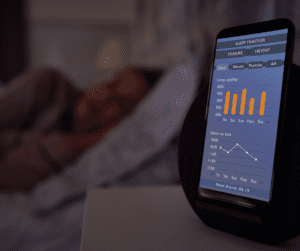
Sleep Tracking
Sleep tracking devices can be useful for helping you recognize patterns in your sleep habits.
The most common sleep-tracking devices include wearables, bedside devices, and bed sensors.
A deeper dive into each of those devices: Here
Now that you know the importance of sleep for you as a runner… you might be thinking to yourself… “I want to get to a good quality night’s rest but can’t fall asleep!”
Running & Insomnia
Very few runners get an adequate amount of sleep.
There is a possibility that their training intensity, their running nutrition, and the time of day that they train could be the cause of their insomnia.
The Points Below Could Be The Cause Of Your Insomnia…
- Overtraining
- Incorrect Nutrients
- Time Of Training
- Nerves & Excitement
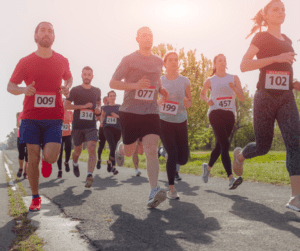
Have a more detailed look in this article at the reasons why overtraining, incorrect nutrients, the timing of your training and nerves could be the reason for your insomnia, and better yet… we share with you some post-training insomnia remedies.
You might be thinking great… All you need to do is sleep more and then your running performance will improve… Let’s have a look at how true that statement is…
Does More Sleep Make You Run Faster?
Yes, One of the most important and easiest ways to increase running your speed and endurance is to sleep more.
Being in a sleep debt will negatively affect your running performance and getting extra sleep will improve your running performance.
Let’s have a detailed look in this article at how getting more sleep will positively affect your running performance.
I think it’s important that we find out if there is a magic number when it comes to how many hours of sleep runners require to improve their running performance…
According to the latest science, healthy adults should get seven to eight hours of sleep a night and endurance athletes should get eight to ten hours of sleep. This is because endurance athletes like runners need more sleep to aid in their recovery.
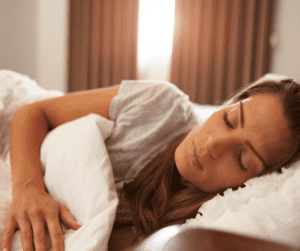
It’s been suggested by experts that adults (non-runners & runners) who sleep less than 7 hours a night are at greater risk of developing health issues compared to those who get 7 hours or more of sleep at night.
Is 5 Or 6 Or Even 7 Hours Of Sleep Enough For Runners? Find out here.
Now that you have all the correct sleep knowledge to apply to your training and improve your performance… there’s still one last thing you need to know…
Should You Sleep More The Longer You Run?
Sleep becomes more important during training periods because full recovery, increasing mileage, and reducing your risk of injury all require an increase in sleep.
When you go on a long run three key physiological adaptations occur in your body – Enzymatic, capillary, and musculoskeletal.
After this process your body needs time to repair itself and adapt to the training and that recovery process occurs while you sleep.
So how much sleep should you be getting after your long runs…


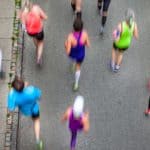
Comments are closed.